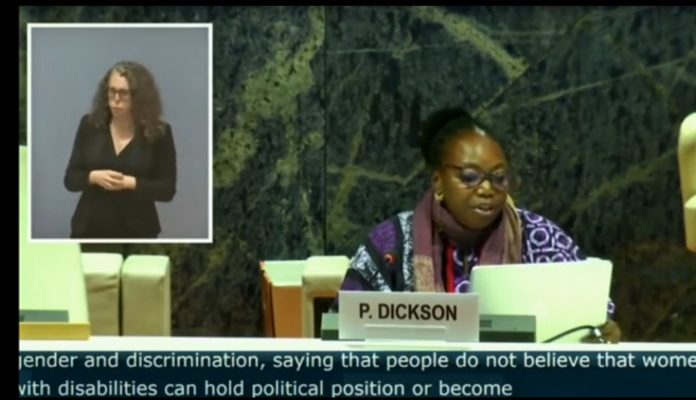Geneva, Switzerland – In a compelling display of leadership and advocacy, Nigeria’s own Mrs. Patience Ogolo Dickson, Executive Director of Advocacy For Women With Disabilities Initiative (AWWDI) , made a resounding case for the political inclusion of women with disabilities on the global stage.
Mrs. Dickson was a key panelist during the 784th Meeting of the 32nd Session of the United Nations Committee on the Rights of Persons with Disabilities (CRPD), held in Geneva, Switzerland. The session featured a Day of General Discussions on the General Comment on Article 29 of the UN CRPD – the article which speaks directly to the rights of persons with disabilities to participate in political and public life.
Addressing a distinguished audience of international experts, diplomats, disability advocates, and government representatives, Mrs. Dickson delivered a passionate and thought-provoking presentation that spotlighted the systemic barriers women with disabilities in Nigeria — and across Africa — continue to face in their quest for full and equal political participation.
“Every woman with a disability deserves not just a voice, but a seat at the decision-making table,” Mrs. Dickson stated firmly, drawing applause from the room.
She highlighted the stark underrepresentation of women with disabilities in political spaces — from local councils to national parliaments — and stressed that without deliberate efforts to break down the visible and invisible walls of exclusion, inclusive democracy would remain a distant dream.
Addressing Structural Inequities
Mrs. Dickson’s address unpacked the multi-layered discrimination confronting women with disabilities: a blend of gender bias, ableism, poverty, lack of education, inaccessible political processes, and cultural stigma.
“Political systems must be accessible, inclusive, and responsive to the needs of all citizens,” she emphasized, challenging governments to implement meaningful reforms that go beyond rhetoric.
She called for enforceable quotas, accessible voting materials, inclusive political party platforms, and the active involvement of women with disabilities in the design and monitoring of electoral processes.
Global Applause for Local Advocacy
Mrs. Dickson’s participation at the UN CRPD session did not just add the Nigerian voice to a global discourse — it centered the lived experiences of women with disabilities in Africa. Her presence as a woman with a disability, an advocate, and a leader demonstrated what inclusion looks like in action.
International stakeholders and fellow panelists praised her bold stance and commitment to dismantling systemic exclusion. One UN official noted, “Mrs. Dickson’s voice is a reminder that true representation is not just about numbers — it’s about ensuring that policies reflect the diverse realities of those they serve.”
A Trailblazer for Inclusive Governance
This is not the first time Mrs. Dickson has taken the global stage to champion disability rights. Her work through Advocacy For Women With Disabilities Initiative (AWWDI) continues to raise awareness, build leadership capacity among women with disabilities, and drive policy reform at national and international levels.
Her advocacy reinforces the importance of implementing Article 29 of the UN Convention — not as a suggestion, but as a mandate. She remains a tireless voice calling for accessible polling units, the inclusion of sign language interpreters, and the removal of attitudinal and institutional barriers that have long sidelined women with disabilities.
Looking Ahead
As Nigeria navigates electoral reforms and debates around representation, Mrs. Dickson’s participation at the CRPD session could not be more timely. Her contributions are expected to shape future discussions around political inclusion and provide a blueprint for governments, civil society, and electoral bodies.
By taking Nigeria’s grassroots realities to the halls of the United Nations, Patience Ogolo Dickson has once again affirmed that the road to inclusive governance must be paved with intentional action, bold leadership, and the unwavering belief that no one should be left behind.
The world is watching. And thanks to leaders like Mrs. Dickson, the voices of women with disabilities are not only being heard — they are shaping the future.


